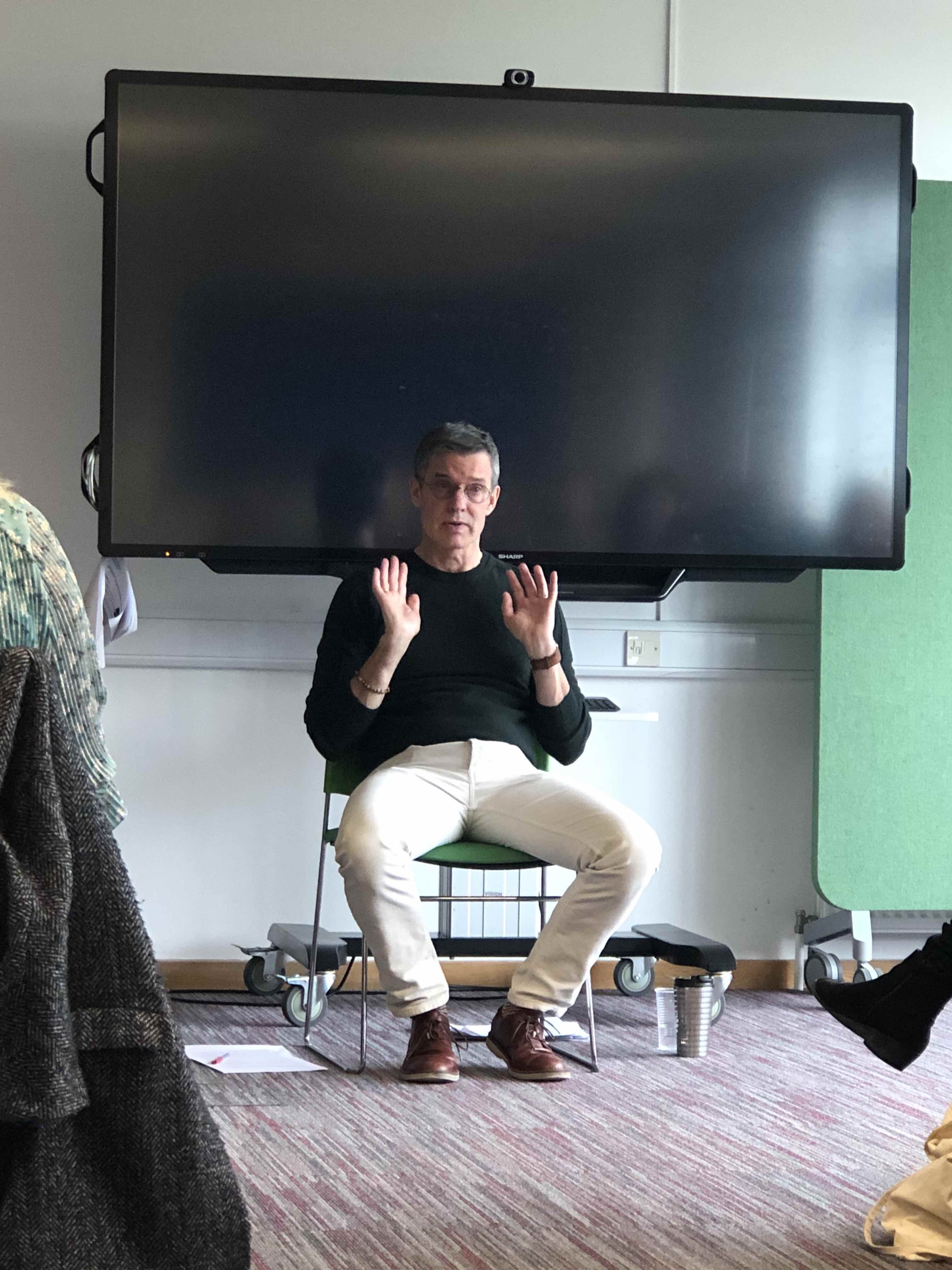 On Saturday I was at the University helping behind the scenes as we got our CPD programme at Brighton up and running. Our inaugural event was led by Dr Greg Madison: a Chartered Psychologist and Registered existential Psychotherapist renowned in the UK (and indeed worldwide) for his work with Focusing. I’ve done a fair bit of training with Greg – and at one point I was making a decision between taking my interest in Focusing-orientated therapy deeper or stay on at Brighton to train in a more generic form of psychotherapy. It was actually interesting to reflect on that this weekend – if I hadn’t stayed on at Brighton to complete the MSc, maybe I wouldn’t have the job that had me on the campus that morning!.One’s life path is an interesting and curious creature!
On Saturday I was at the University helping behind the scenes as we got our CPD programme at Brighton up and running. Our inaugural event was led by Dr Greg Madison: a Chartered Psychologist and Registered existential Psychotherapist renowned in the UK (and indeed worldwide) for his work with Focusing. I’ve done a fair bit of training with Greg – and at one point I was making a decision between taking my interest in Focusing-orientated therapy deeper or stay on at Brighton to train in a more generic form of psychotherapy. It was actually interesting to reflect on that this weekend – if I hadn’t stayed on at Brighton to complete the MSc, maybe I wouldn’t have the job that had me on the campus that morning!.One’s life path is an interesting and curious creature!
Having practiced Focusing a fair bit myself, and having helped others use Focusing in therapy and through meditation classes, I am well versed in how beneficial it can be. Yet I found myself surprised when Greg took us through an initial Focusing session at the top of the morning. This past weekend I have had the opportunity for 3 days of intensive Ngondro – the practice I am now doing since becoming a student of Vajrayana Buddhism last autumn. By the time I arrived on campus for Greg’s event Saturday morning, I had already meditated for nearly two hours. When Greg invited us to turn inward, I assumed I already knew “how am I?” And this was an interesting thing to observe and play with once I noticed my assumptions…
With one whole day of Ngondro on Friday under my belt, I was in touch with “being stirred up”; the combination of liturgy, mantra, chants, prostrations, visualisation within the ritual moving (what Tibetan Buddhism calls) the energy body. For me, I am on a rather sharp learning curve as to how this impacts my emotional world. And with four sessions each day, there was (at least) four more times of process going on! By Saturday morning, I felt I had a hold on what was being shifted – yet this was at the very heart of what Greg was speaking to; urging us to let go of. Even with my profoundly more tuned internal eye these days, it is still possible to make assumptions – this time about my internal and emotional process. I was guilty of not “adopting a radically open phenomenological view” (that Focusing lends us); I had started the Focusing session thinking I already knew I was stirred up, and having already “known” what was going on for me.
Thankfully I spotted this about 10 minutes in. Greg’s narration and the companionship inward that it offered took me to a deeper level of listening. As we travelled deeper, I noticed a feeling below the ‘presumed feeling’ (and the associated story). I slowly let go of my projections and allowed the felt-sense in my solar plexus come forth. I let go of the certainty of what was going on for me, and settled for the “vagueness” often offered up by Focusing. It was less important that I knew what was going on for me, more important I just kept that part of me company – it will reveal the message it has for me when it is ready*.
The key was staying with the not knowing. “Humans are always unfinished, until we die (and then we don’t know what happens)”. Can we learn to celebrate this “not knowing?”
It reminds me of my all-time favourite Chogyam Trungpa quote on groundlessness.
It is useful as a psychotherapist to reflect upon what “keeping company” means: the importance of the relational in holding the process of another. Greg was keen to point out that offering “professional” presence can be misleading – central to the underpinning of Focusing is that inside and out are not different, so the client’s experience is not separate to that of the therapist. We are not separate people in the room (neither are we “one”), we “make who we can be together”. Even though Greg was narrating the Focusing session to the whole group that morning, there was a sense of him being within the creation of my embodied process, the “subterranean connection” that allowed me to shift in to another level than my meditation practice had that same morning. The relationship within facilitated by the relationship without…and I would offer vice versa.
 It was an insightful morning with Greg, and he covered a lot of ground in the 3 hours. To do him and the time he offered justice, I’d like to make mention of a few other key points he raised:
It was an insightful morning with Greg, and he covered a lot of ground in the 3 hours. To do him and the time he offered justice, I’d like to make mention of a few other key points he raised:
Process as metaphor – Language is very important in carrying forward our experience. Yet, process as ongoing needs to be honour, so there is much importance of not trying to pin down our experience. In fact, I noticed this when writing in my journal Saturday evening: my attempts to put it all in the written word and “make sense” of it all could have blunted the potency if what was (and remains) ongoing. Human beings are verbs
Home and belonging – Greg spoke to how we can feel like foreigners in our own world; and without an omnipotent anchor, the only thing we can hold on to is the experiential, the embodied process. Many of us feel exiled from the only true home we can have: we have become distanced from our self. This is very much akin to the Buddhist notion that the meditation path is “the road home”
Embodied democracy – When we learn to turn inward, we may start to experience that we are not a unitary, fixed self. As we open, we begin to discover a whole community of “parts”. Greg encouraged us to hear each voice, and no matter how shy or scared, each is as important as the “I” we often identify with. And why not see this as the start of a chain? Listening to self, listening to other, and then to community – what better underpinning of a true democracy? He added “Listening, not voting, is the most democratic act”
I write this on Monday afternoon after a morning of client work. After the weekend of deep processing for me, and in the spirit offered by Focusing, I felt more in tune with my inner process and felt like I was practicing from a more intuitive place. Two of my clients naturally moved toward a focusing-type process, closing their eyes as they tried to answer “how am I?”. Feeling in to my own experience of being-with-them-in-theirs, both clients seemed to move away from the content and get some clarity around the issue-as-experienced. From the “what” to the “how”.
At the bottom of my notepad on Saturday, I had written the following notes which feel like an appropriate way to leave this week’s post…
We tend to focus on content
But if that is the case, how does “change” happen?
Implicit is what changes explicit
Process is what changes content
————
*and needless to say, it did over the course of the following 7 Ngondro sessions of the weekend!
An invitation to check out our second CPD event, Saturday 18th April, 2020:
An Audience with Dr Manu Bazzano
“Subversion Therapy – Promoting Intelligence, Affect, and Rebellion in the Age of Neoliberal Stupidity”

